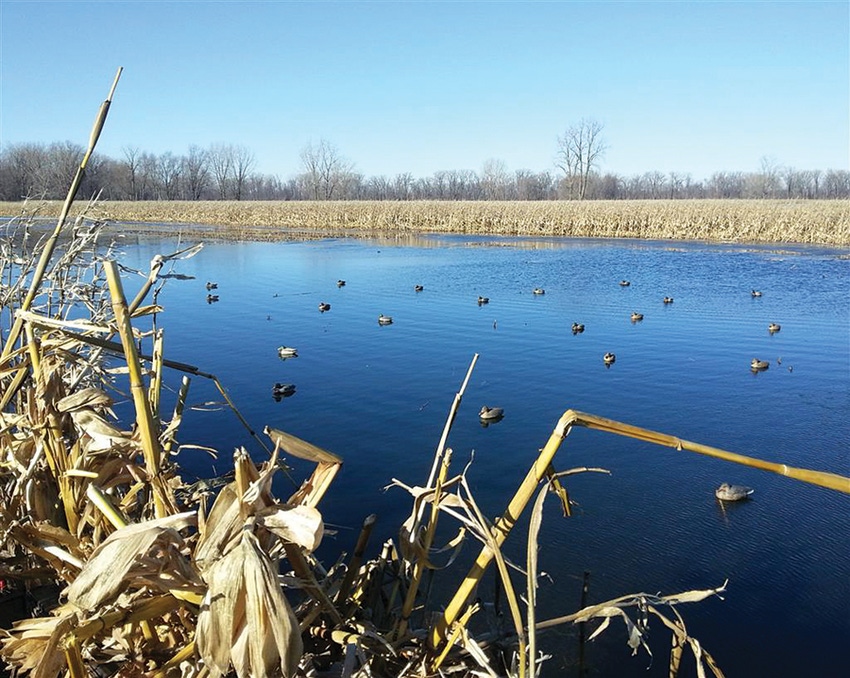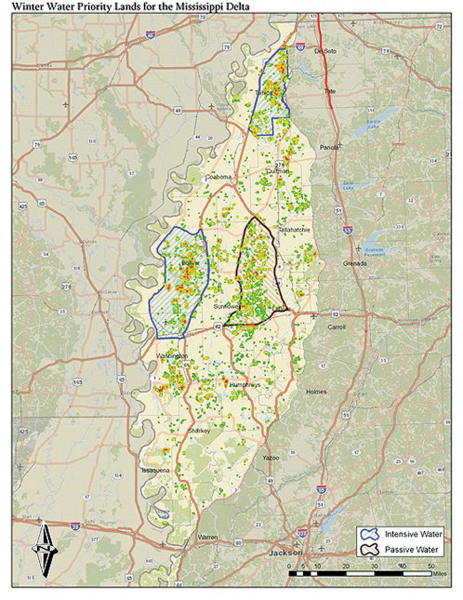
A Winter Water for Wildlife project is aimed at raising awareness among Delta landowners about the importance of winter water in flooded agricultural areas and conservation program lands to provide habitat for priority wildlife species. The pilot program will include three areas of the Mississippi Delta.

The Mississippi Department of Wildlife, Fisheries, and Parks Wildlife Mississippi, and other partners have announced a Winter Water for Wildlife pilot project that will assist private landowners in the Mississippi Delta with incentive payments to flood crop fields and manage wetland areas to provide habitat for migrating water birds.
This will include existing Wetlands Reserve Program areas.
The goal of the Winter Water for Wildlife project is to raise awareness among Delta landowners about the importance of winter water in flooded agricultural areas and conservation program lands to provide habitat for priority wildlife species.
The three project focal areas are:
•Bolivar— lands north of Highway 82, east of Highway 1, south of Highway 32, and west of Highway 61.
•Sunflower — lands north of Highway 82, east of Highway 3, and west of Highway 49E. (Landowners in the Sunflower focal area will not be required to pump groundwater to flood fields to participate in the program, but will receive a lower incentive rate.)

MAP shows the areas included in the Winter Water for Wildlife project.
•Tunica — lands in Tunica County, east of Highway 61.
Landowners must submit an application before June 1, 2014, for project consideration. All applications will be competitively ranked, based on potential habitat benefits.
Providing dependable wetland habitat in working landscapes such as the Mississippi Delta is sometimes difficult, the agencies note, because of the need of agricultural producers to maintain profitable land use.
The Migratory Bird Habitat Initiative (MBHI), a USDA-NRCS program that provided financial incentives for private landowners to flood agricultural fields during the winter, was extremely successful during the years it was funded (2010-2013).
Although several studies associated with the MBHI demonstrated the potential for providing quality habitat in working landscapes, funding for the program has been discontinued.
AG NEWS delivered daily to your inbox: Subscribe to Delta Farm Press Daily
While increasing the amount of winter water on the landscape of the Mississippi Delta is a high priority that was addressed by the MBHI, agency officials say, it didn’t address key issues such as strategic targeting of habitat acres and cultural perceptions against managed flooding that may hinder long-term sustainability of such practices.
Benefits of project
Providing additional winter water in focal areas will greatly increase the attractiveness and carrying capacity for waterfowl and other wetland dependent wildlife, they say. Shorebirds and wading birds will also benefit from reliable shallow water habitats during fall and spring migrations; periods when shallow wetlands are typically limited in supply.
Wildlife Mississippi (WM), the Mississippi Department of Wildlife, Fisheries and Parks (MDWFP) and its partners have proposed the pilot Winter Water for Wildlife project to create wetland habitat in one or more key areas in the Delta in conjunction with outreach and education efforts to increase landowner awareness of the benefits of wetlands and winter water on the landscape.
With the assistance of the Lower Mississippi Valley Joint Venture and the Louisiana/Mississippi Conservation Delivery Network, Wildlife Mississippi, the Mississippi Department of Wildlife, Fisheries, and Parks, and its partners developed a model to identify focal areas based on existing infrastructure for water-holding capacity on hydric soils in the Delta region.
The model indicated three primary focal areas (Figure 1). The project's focal areas are defined by state highways in order to be more relevant to private landowners.
One of the focal areas identified by the model is in an area of Sunflower and Leflore Counties known to have a depleting aquifer. The partners elected to designate this area as a passive water management area, where pumping ground water to initiate flooding would not be required to participate in the program.
However, landowners who do not pump water to achieve required flooding levels may not receive a full incentive payment. Landowners in the passive water area may receive a full incentive payment if they achieve and maintain required flooding levels, using surface water where applicable.
Maintaining flood levels
In the remaining two focal areas, pumping of ground or surface water, or intensive water management, will be required if needed to initiate and maintain required flooding levels on non-agricultural lands.
Projects in the intensive water management focal areas on agricultural lands only will be allowed to flood passively using precipitation; however, these projects will receive a reduced incentive rate and will receive a lower score in ranking for entry into the program.
For more information on program rules, areas included, and incentive payments, visit http://bit.ly/RGdYH4.
Information may also be obtained by contacting Brian Ballinger at Wildlife Mississippi, (662) 686-3375, ext. 107, e-mail [email protected]; or John Gruchy at Mississippi Department of Wildlife, Fisheries, and Parks at [email protected].
To learn more about the Winter Water for Wildlife project, visit www.mdwfp.com/winterwater. For more information regarding wildlife management, visit www.mdwfp.com or call (601) 432-2199.
About the Author(s)
You May Also Like



